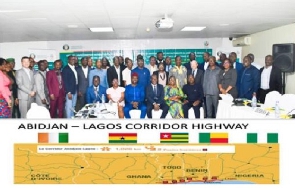Technical committee of experts who met in Accra ahead of the meeting which preceded the 19th Ministerial Steering Committee which consists of Ministers of Works and Roads Infrastructure of the five (5) Corridor Member Countries (CMCs) have expressed optimism that the much awaited Abidjan-Lagos Corridor Highway Development Project which is a six (6) - lane carriage standardized 1, 028km long highway project and forms part of the Dakar-Lagos Trans African Highway has a great potential to accelerated the AfCFTA implementation promoted economic development of the 5 member countries.
Mr. Chris Appiah, the Acting Director, Directorate of Transport, Department of Infrastructure, Energy and Digitalization of the ECOWAS Commission, recounted the economic importance of the Abidjan-Lagos Corridor Highway Project as a principal catalyst to West Africa’s economic growth and to a large extent Africa’s vision of achieving Economic Integration through the AfCFTA.
“Our project is a multi-national economic corridor project. It’s not just a transport or road project. It’s an economic corridor project with 6-lane dual carriage highway from Abidjan to Lagos”.
He asserted that a reliable and harassment-free corridor highway will form the basis for which the African Continental Free Trade Area (AfCFTA) as a principal program of the African Union’s Agenda 2063 can successfully be implemented.
“We are also very much aware of continental and regional initiatives which aim to boost trade in Africa and translate into economic development; principal among this is the African Continental Free Trade (AfCFTA). Without projects like the Abidjan-Lagos Corridor Highway Project, the AfCFTA will remain on the papers, because we know, we are the carriers of Trade”.
Ing. Dr. Abass M. Awolu, Chief Director of Ghana’s Ministry of Roads and Highways, indicated that the Abidjan-Lagos Corridor Highway Project which was once a vision will soon become a reality to boost economic activities among the member countries as the technical studies for the all-important project is near completion.
Engr. Ibi Terna M., Chairman of the Committee of Experts, recalled that the Abidjan-Lagos Corridor Highway project is a transformational project which will stimulate economic activities in West Africa.
“The experts therefore have a huge responsibility to ensure that the project meets the expectations of the people along the corridor and is completed within a reasonable time frame.”
The Chairman also highlighted the attractiveness of the project for investors and indicated that ECOWAS is about to make history with the highway “Let us stay the course until the project is completed for the good of our populations, the prosperity of West Africa and the African Continent in general.
Heads of State of ECOWAS member countries formally approved the construction of a homogenous highway corridor to link the five countries of Cote d’Ivoire, Ghana, Togo, Benin and Nigeria at the 42nd Ordinary Summit in February 2013. The corridor highway links major cities in West Africa including Abidjan, Accra, Lomé, Cotonou, and Lagos.
It also connects dynamic sea port infrastructure which service the region’s landlocked countries of Burkina Faso, Mali and Niger and therefore accounting for 75% of trade volumes within West Africa, making the corridor a great potential for accelerating West Africa’s economic growth.
According to the Project Treaty signed by the five (5) Heads of State and Government, an Abidjan-Lagos Corridor Management Authority (ALCoMA) will be established to construct, manage, and operate the 6-lane Highway and related economic development activities.
The Project is currently at the study stage and the Feasibility Study reports and Preliminary Designs have been completed. The project preparation and technical studies is being funded by the African Development Bank, European Union and the ECOWAS Commission and also near completion.
The Feasibility and Preliminary Studies reports show an average Economic Rate of Return of 15% on investment. Many sections of the Corridor also recorded very high traffic levels which will justify private sector investment and together with the economic activities to be packaged with the highway, public-private partnerships project financing models are being considered for the construction of the highway.
The African Development Bank (AfDB) is the lead financial and technical Partner, with the European Union also supporting with funds from their Africa Infrastructure Investment Funds (AfIF).
Press Releases of Thursday, 1 June 2023
Source: Single African Market

















